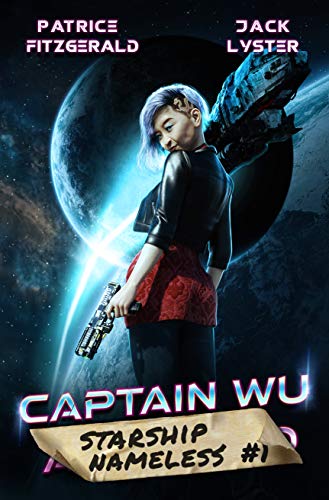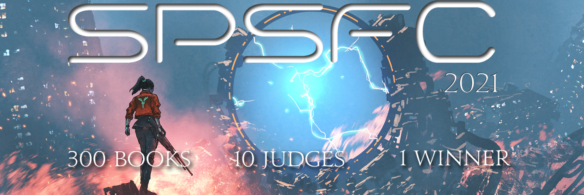
By Rogers Cadenhead: In a universe controlled by a central government indifferent to the needs of its inhabitants, a crew of interstellar vagabonds uses their jury-rigged spaceship to take whatever work they can get — legal or otherwise — barely scraping by while showing an exceptional knack for finding trouble. A charismatic battle-scarred captain leads a fiercely loyal crew of close-knit misfits.
What sounds like Firefly also describes the SPSFC finalist novel Captain Wu: Starship Nameless #1, a space opera by authors Patrice Fitzgerald and Jack Lyster. I love Firefly so it wasn’t a big leap to climb aboard this vessel.
Captain Leanne Wu is a Asian woman in her sixties at the helm of “an old converted garbage scow called the Nameless. It was an odd boxy little thing but with powerful engines.” Wu is small of frame but literally pugnacious, getting into pit match fights both for money and stress relief.
The novel has barely begun when a smuggling job lands Wu and her crew neck-deep in distress. While trying to deliver an unknown package to a client that was planning to kill them in lieu of payment, a squad of tentacle-mouthed aliens arrives firing their weapons at both sides of the transaction.
This begins a tale that is full of chase sequences where the reason the aliens are attempting to kill them is not known. A lot of ingenuity and technological prowess are required for the protagonists to survive long enough to see book 2. The crew also acquires a stowaway with a familial tie to a crew member.
I found the novel was carried mostly by character, feeling less pull from the plot except as a vehicle to create interesting problems to solve.
Wu’s bisexual and her pilot Rev is transgender, representation that’s handled matter of fact. Wu gets most of the focus as a character but her back story is revealed only in dribs and drabs, which is understandable because did I mention aliens keep trying to kill them? In the final third we meet someone who might be the biological father of Wu’s daughter but has never been told this fact. It’s my favorite revelatory relationship in the book because you can tell the guy’s so foul his evil will take center-of-the-Tootsie Pop time to reveal. However, when he’s first met I was all “Leanne, what the hell is the problem? He seems nice.” (I give my heart to the wrong people in fiction.)
Captain Wu reminded me of Reverdy Jian, another LGBT space pilot who leads Melissa Scott’s excellent but overlooked 1992 novel Dreamships. Space pilots in that book navigated abstract “dreamspace.” In this one, space travel is amusingly humdrum. There are huge lines of ships at interstellar gates where Rev has to dodge miles-long vessels full of shipping containers. It has all the romance of a traffic jam on Interstate 12 in Baton Rouge.
Like Firefly, the Nameless has a crew whose stories I’d love to see fully told. My favorite is Six, a member of a collective race whose reason for no longer being among them is not explained. The authors pull off a sly trick in dialogue — the word “alone” is hard for Six to express. Six takes Wu aside at one point for private counsel and says, “This is why I wished to speak with you when you were as you are now.”
If this was a normal review I would stick the landing and say I enjoyed this jaunty series starter, which left me eager to continue to Smugglers Crew: Starship Nameless #2.
But this is a review for SPSFC, a contest to award the best self-published novel in science fiction. One of the things I consider is whether an entrant succeeds as a standalone even when it leaves readers wanting more from the series. I needed more information about the MacGuffin that Wu had the misfortune to schlep across the galaxy, but the first Starship Nameless novel leaves huge questions unanswered when a cliffhanger ends book one.

SPSFC art by Tithi Luadthong. Logos designed by Scott (@book_invasion)
Discover more from File 770
Subscribe to get the latest posts sent to your email.
